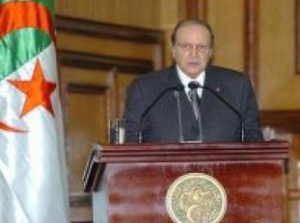By Dan R.
While its people face incredible hardship under a corrupt regime, Algeria’s bloody recent history remains in fresh in the minds of anyone seeking to rise up.
While much of North Africa has been swept by political or social changes, Algeria’s political system has remained virtually untouched, with its short-lived and decentralized protest movement failing to resonate with the population until now. Several factors have attributed to this relative calm.

Like many North African countries, Algeria was a French colony, however unlike many countries, Algeria fought for its independence in a bloody war that lasted 8 years. In part, the Algerian nationality was built and forged during this conflict. This level of nationalism rarely exists in the Arab world; it can be seen in Algeria and periodically in Egypt, as it is in direct contradiction to conservative Islamic beliefs.
In the late 80’s the Front de Libération Nationale (FLN) socialist faction was dominated the Algerian political system. Starting from 1987, the FLN’s influence began to wane as the economy, based on the production of crude oil and natural gas, collapsed due to a sharp decrease prices. In 1989 the FLN announced the formation of a new constitution which denounced socialism, promised freedom of speech and other personal freedoms.
Following the announcement, new political parties were formed and recognized by the government. One of the new leading parties was the Front Islamique du Salut (FIS), an Islamic party, with a goal of establishing an Islamic state ruled by Sharia law. In the 1991 elections, (FIS) won 188 out of 232 seats at the Algerian parliament (48 percent of the votes), inevitably party leaders demanded to form a new government headed by the FIS.
The election results were denounced by the army, sizing the power with a coup d’etat, deposing President Bendjedid, outlawing the FIS and performing mass arrests on suspected FIS members, sending them to prison camps in the desert. Left with no choice, the FIS fled to the mountainous outskirts of the northern provinces, waging a guerilla war against the government, initially targeting military forces, later switching to civilian targets. The conflict evolved into an all out civil war which lasted for 10 years with an estimated 100,000 casualties.
The 1999 elections brought Abdelaziz Bouteflika to the president’s seat. President Bouteflika had a key role in Algeria’s war of independence, as one of the FLN leading members. During the 70’s Bouteflika served in various cabinet positions, until his resignation in 1975 after losing in the presidential elections. His second rise to politics in the late 90’s was backed by army generals, prompting calls by the public that he a puppet controlled by the army. Bouteflika was elected once again in the 2004 with an 85 percent majority and remains in power to date. In December 2011 rumors regarding the 74-year-old president health were made after missing a scheduled speech.
The political stability in Algeria was shakened by the Arab Spring, as major unrest shoot neighboring Libya and Tunisia. Many Algerians took to the streets protesting over the lack of housing, jobs, and demanding social reforms. During the protests security forces arrested thousands, hundreds were injured and killed. President Bouteflika reacted with a promise to lift the 19-year state of emergency and revise the country’s constitution. Demonstrations subsided after the cabinet adopted a resolution to lift the state of emergency. It is likely that the memory of the long and bloody civil war was also a factor of the relatively short Algerian spring, as the memory remains fresh in the minds of many Algerian’s. However, the atmosphere in Algeria remains tense as the economic situation worsens. Many of the youth who are recovering from the mental scars from the civil war, are forced to deal with these issues along with high unemployment, poverty, and corruption.
Moreover, the rise of Islamic political parties in Egypt, Tunisia and Morocco, rekindled the FIS’s dream of returning to politics. Activists and leaders of the party recently called to boycott the election and vow to act ‘peacefully’ against the government until their dream is fulfilled. They see an opportunity with the reports of Bouteflika’s failing health and along with the encouraging success from their counterparts in Morocco and Tunisia.
However, the power behind the president’s throne was and still remains the army and the generals. If the president retires before completing his long awaited reforms and is replaced by yet another military puppet, the people may rise up once more, despite their fears of renewed violence.
Want to learn more about business continuity in Algeria? Click Here.